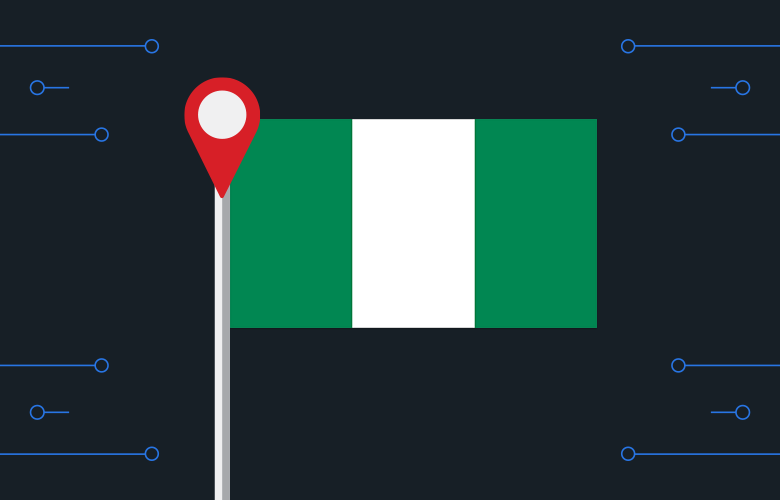November 17, 2021
VPN vs Tor: What’s the Difference in 2026?
For anyone looking for tools to provide enhanced online anonymity, VPNs and the Tor browser are [...]

WHAT’S IN THIS REVIEW?
Disclaimer: Partnerships & affiliate links help us create better content. Learn how.
Nigeria has long been seen as a vibrant tech hub in Africa, with the tech sector deemed the fastest-growing in the country during 2021.
As such, it’s no surprise that many users switched to VPNs to access Twitter when the social media platform was banned for several months after it deleted a tweet by President Muhammadu Buhari.
If you would like to use local Nigerian apps and services but would prefer to spoof your IP to ensure privacy and anonymity, here’s everything you need to know to get started with a VPN.
A virtual private network (VPN) will mask your IP address as it sends data to and from your device in an encrypted tunnel.
Changing your IP address is as simple as selecting another server while logged in to a VPN, and you can also access international content and websites by choosing a server in a corresponding country. (For example, you’ll be able to unblock BBC iPlayer with a UK server.)
Aside from the Twitter ban, Nigeria has faced sporadic interruptions to internet coverage over the past year or so. For example, research by Freedom House found that:
“In January 2021, the news website Peoples Gazette was blocked on mobile internet services provided by Airtel, MTN, 9mobile, and Glo. Samuel Ogundipe, the website’s managing editor, alleged that the government ordered the block in retaliation for the outlet’s October 2020 investigation into the professional competency of President Buhari’s chief of staff. As of July 2021, the Peoples Gazette was accessible at a different URL.”
Freedom House concludes that “Nigeria’s vibrant media landscape is impeded by criminal defamation laws,” so a secure VPN is a great way to access independent news sites without worrying about anyone snooping on your web traffic.
However, it’s likely the majority of users would prefer to benefit from increased privacy while they’re online, rather than solely being able to access previously blocked content.
Many VPNs offer thousands of servers that are perfect for browsing anonymously in countries like the United States, but what if you’d like to access a local Nigerian site for banking or for a similarly sensitive reason?
There is a solution in the form of virtual servers.
A provider with VPN servers located in Nigeria is an obvious place to start, although that can be more difficult than you may have expected. (Most VPNs have a tendency to focus on the United States and Europe, especially when compared to Africa and the Middle East.)
If not, try to ensure that they have capable virtual servers, or physical servers found nearby for the best results in terms of connection speeds. We’d also recommend using a service with an automatic killswitch, so there’s no chance of your data leaking inadvertently. (After all, an exposed IP address defeats the purpose of a VPN completely).
Ideally, the service will be audited by a third-party, so you won’t have to take any of their claims about privacy at face value. We’ve listed a trio of the best options for Nigeria below.
| VPN | Lowest Price | # of Devices | Countries |
|---|---|---|---|
| CyberGhost | $2.23/mo. | 7 | 91 |
| Private Internet Access | $2.19/mo. | 10 | 84 |
| ProtonVPN | $3.29/mo. | 10 | 54 |
CyberGhost has a collection of 13 servers located in Nigeria which can be used to access local websites and services. This is accompanied by a further 6,000+ dotted around the globe.
However, they don’t allow for P2P file sharing on their Nigerian servers, and they’re not physically located in the country. (Instead, a virtual server is used to give the appearance of being in a location, which may not be possible due to security concerns or because it’s a cheaper option for the provider.)
In this case, we’d assume that it’s more likely to be the former, given a lack of data centers in the region.
If you wish to access content in other regions, CyberGhost offers several streaming and torrenting-optimized servers to choose from. Specifically, places like the US, UK, and Australia are among the most popular and easy to access.
Private Internet Access (PIA) is another VPN with virtual Nigerian servers in their extensive network that spreads across a total of 84 countries. PIA mobile apps for iOS and Android offer a 7-day free trial period, and they provide a 30-day money-back guarantee on all plans.
The software is open-source, and it’s a much cheaper option compared to a lot of other top-rated VPNs. As of January 2022, they’ve been around for over a decade, cementing their spot as one of the more respected providers you’ll find.
Once again, it’s a great choice if you’d like a Nigerian IP address, or if you’d prefer to access servers located around the globe.
ProtonVPN is a viable premium provider that offers servers in Nigeria, this time routed via Sweden.
Secure Core “routes network traffic through servers in privacy-friendly countries like Switzerland or Iceland for superior privacy and security.” For additional ease of mind, Secure Core servers and networks are fully owned and operated by ProtonVPN for extra safety.
It’s hard to go wrong with their in-house setup.
In this case, Sweden is used for anyone hoping to spoof a Nigerian IP address. They also have a built-in ad blocker called NetShield. (NetShield protects your device and may speed up your browsing by blocking ads, trackers, and malware.)
Here’s a quick step-by-step guide to connecting to a virtual Nigerian server with a VPN.
As far as web browsers go, Tor is arguably the best solution for privacy-focused users. Tor (The Onion Router) is completely free to use and is run by a non-profit organization based in Massachusetts.

It’s a browser that is used to prevent anyone from knowing about the websites you visit, by sending your web traffic through three random nodes (or servers) contained in the network.
They’ve also been vocal advocates for improved internet freedoms in Nigeria, going back as far as 2010, offering their services to users.
However, spoofing your Nigerian IP address with Tor should not be the default, but does have special use cases where it comes in handy. It’s inadvisable to use Tor for tasks like banking due to the random nature of the node system. Tor is great for web traffic, but a VPN will protect all data sent to and from your device while in use.
The usage of VPNs is legal in Nigeria, although you could face issues if you’re found to be accessing blocked services. It’s a grey area, which has reportedly been exploited in the past.
Another option would be to look to decentralized VPNs like Mysterium, which reportedly saw an influx of Nigerian users in 2020.
The decentralized nature means that it can’t log user data, while it uses P2P crypto payments that add further anonymity.
There are no Nigerian nodes as of March 2022, but there is decent coverage across Africa. (Mysterium exit nodes are typically residential, offered by members of the public. This makes it more difficult to detect that a VPN is being used in the first place.)
Free VPNs are always tempting, especially if you only plan to use your service for light browsing. After all, why should you have to pay for something that is seemingly available for free?
The problem is, it’s inadvisable to use an inferior provider, and it could lead to issues if you’re worried about privacy and anonymity above all else. Free VPNs tend to offer slower speeds and fewer servers, and it’s not worthwhile from a security perspective.
It’s common knowledge that numerous “free” VPNs can sell or share your data to third parties, and it’s not like they’ll have an audit to back up any claims. It’s not worth having your data harvested, or even inadvertently exposed, such as when researchers from Wizcase:
“…discovered a major leak affecting Quickfox, a free VPN service primarily used to access Chinese sites from outside of mainland China. The leak exposed a variety of personally identifiable information (PII) from users, including names, phone numbers, other software installed on their device, and more.”
The data wasn’t encrypted nor protected by a password or any login credentials. Wizcase estimates that the breach affected at least a million Quickfox users. (This was reported in October 2021.)
We’d be cautious if you plan to use a free provider regularly. They’re known to leak or sell user data, and it’ll defeat the purpose if you’re looking at VPNs to improve online privacy. It’s fine if you just want to download torrents or stream TV shows, but it’s inadvisable for anything else.
If you’re desperate, we’d recommend checking out Tor rather than opting for one of the many free providers on the market. Otherwise, we’ve sifted through hundreds of free providers to put together a list of freemium VPNs that can successfully hide your Nigerian IP address, protect your online data, and unblock streaming websites.
VPNs are a viable method to improve online privacy in Nigeria, although we’d advise checking out the Tor browser if you don’t mind slower speeds and a random exit node. For a Nigerian IP address, check out one of the top VPNs we’ve listed above for the best possible results.
You’ll be able to access a range of international services with the use of a Nigerian VPN, including football matches, TV shows, and news websites that may have been blocked previously. You’ll also be able to browse privately in Nigeria.
WHAT’S IN THIS REVIEW?

| Cookie | Duration | Description |
|---|---|---|
| __cfduid | 1 month | The cookie is used by cdn services like CloudFlare to identify individual clients behind a shared IP address and apply security settings on a per-client basis. It does not correspond to any user ID in the web application and does not store any personally identifiable information. |
| cookielawinfo-checkbox-advertisement | 1 year | The cookie is set by GDPR cookie consent to record the user consent for the cookies in the category "Advertisement". |
| cookielawinfo-checkbox-analytics | 1 year | This cookies is set by GDPR Cookie Consent WordPress Plugin. The cookie is used to remember the user consent for the cookies under the category "Analytics". |
| cookielawinfo-checkbox-necessary | 1 year | This cookie is set by GDPR Cookie Consent plugin. The cookies is used to store the user consent for the cookies in the category "Necessary". |
| cookielawinfo-checkbox-non-necessary | 1 year | This cookie is set by GDPR Cookie Consent plugin. The cookies is used to store the user consent for the cookies in the category "Non-necessary". |
| cookielawinfo-checkbox-performance | 1 year | This cookie is set by GDPR Cookie Consent plugin. The cookie is used to store the user consent for the cookies in the category "Performance". |
| viewed_cookie_policy | 1 year | The cookie is set by the GDPR Cookie Consent plugin and is used to store whether or not user has consented to the use of cookies. It does not store any personal data. |
| Cookie | Duration | Description |
|---|---|---|
| cookielawinfo-checkbox-functional | 1 year | The cookie is set by GDPR cookie consent to record the user consent for the cookies in the category "Functional". |
| cookielawinfo-checkbox-others | 1 year | No description |